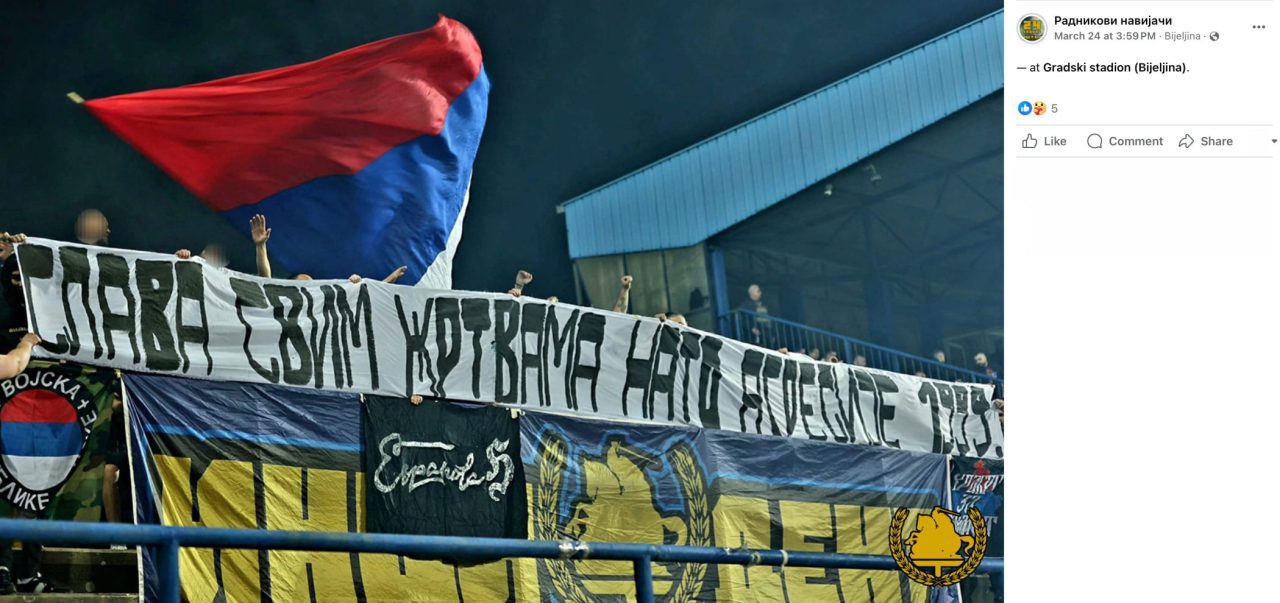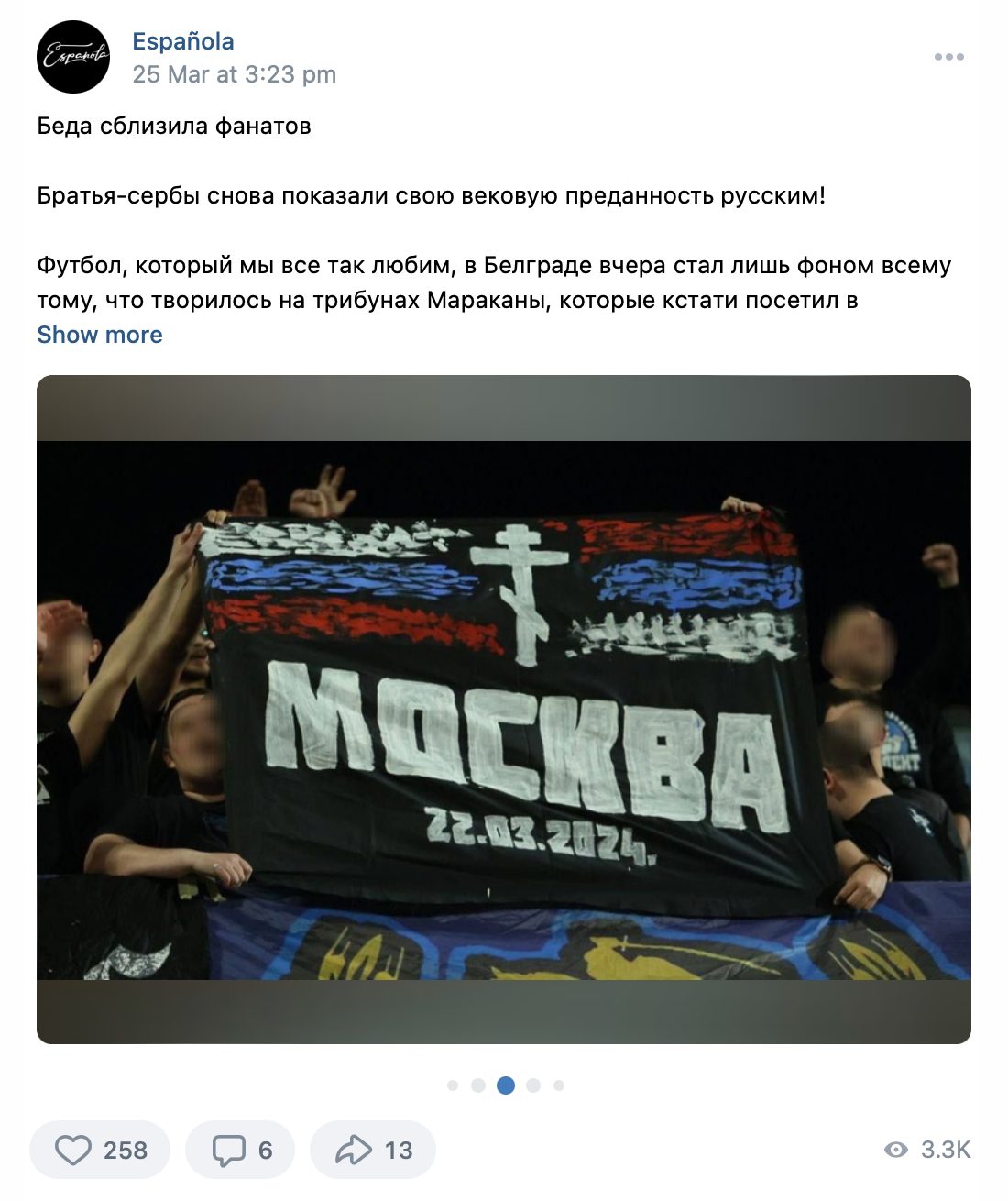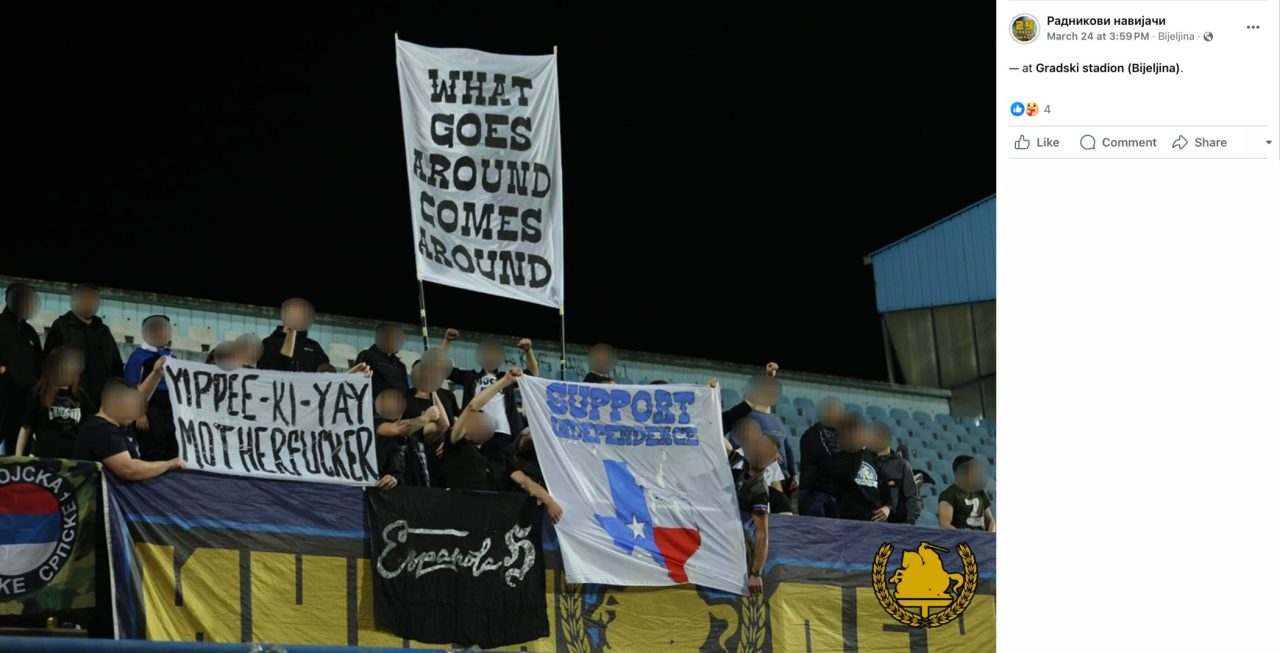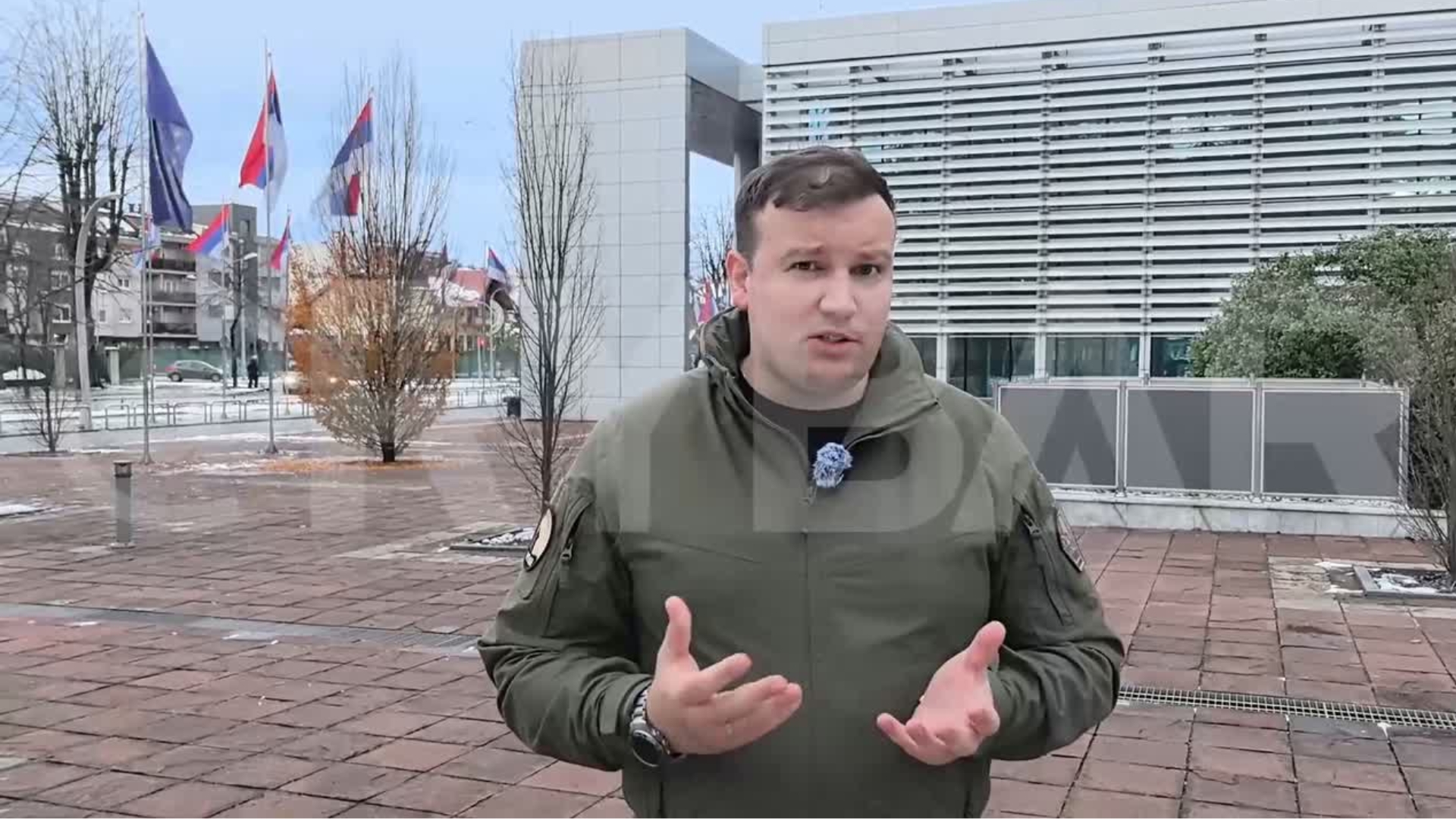This post is also available in: Bosnian
The football fans also displayed a map of Texas with a text stating that the fans supported the independence of the American state due to the U.S.’s support of Kosovo’s independence.
The Football Federation of Bosnia and Herzegovina previously penalised clubs for displaying political messages, but they have recently ignored Detektor’s queries about neo-Nazi insignia that the fan group “Incident” has displayed in the stands in Bijeljina.
Director of the football club Radnik, Goran Janjic, said that they do not check fans’ banners at the entrance and added that he wasn’t aware that fans displayed a banner referencing a military unit.
“I am not familiar with that. I don’t know that something like that happened, I cannot comment,” Janjic said.
He said that the club supports fans’ patriotic messages, but sanctions offensive ones. He considers a delegate of the Football Federation responsible for the fans’ actions and pointed out that the Federation didn’t object to previous fan displays. Detektor discovered that fans had previously displayed a skull symbol that was used by Nazi units during World War Two.
Following the recent terrorist attack in Moscow, many groups and individuals have paid respect to the victims while some have used the opportunity to reiterate their support for the Russian invasion of Ukraine. On sport fields in Bosnia and Herzegovina (BiH) and Serbia, the support has taken the shape of displaying, among others, the banner of Espanola, a military unit active in the Donbas region of eastern Ukraine consisting of fans of several Russian football clubs.
 Espanola sign in Bijeljina. Photo: Screenshot, Radnik fans, Facebook
Espanola sign in Bijeljina. Photo: Screenshot, Radnik fans, Facebook
In a post on Facebook, fans of the Bijeljina football club Radnik celebrated a victory by their team and included photos from the stands showing the usual banners of the group, T-shirts with the letter Z and a black flag reading Espanola. The word is written in the same manner as on the military unit’s logo. Espanola claims to consist of fans of several Russian football clubs who have put aside their internal conflicts to “jointly defend the Russian people.”
The sign that appeared in Bijeljina differs slightly from Espanola’s official logo, which includes an image of a pistol in addition to the stylized font. The pistol image was omitted on the flag in Bijeljina.
According to Espanola’s official page on Telegram, members of the group call themselves “the first fan volunteer brigade” engaged in “military football” through a united front for Russia. The description is accompanied by a call for cooperation and instructions to contact someone named Daniilo Maloya.
The contact person has not answered Detektor’s message which asked about Espanola’s relations with fans from Bijeljina and Belgrade, and how they view the support they receive from the Western Balkans.
Espanola has also received support from members of the Delije fan group during a friendly match between Red Star Belgrade and Saint Petersburg’s Zenit. Photographs published on social media depict fans of the two clubs displaying a huge banner with designs of the Serbian and Russian flags, between which there is a masked soldier and the slogan “Brothers Forever”. The fans then made the letters Z and V in the stands using torches. The letters are symbols of the Russian invasion of Ukraine.
The whole time, alongside the large banners, fans of the Belgrade club were displaying a black flag with the word Espanola.
 Epsanola post with photo from Bijeljina. Photo: Screenshot, Espanola, VK
Epsanola post with photo from Bijeljina. Photo: Screenshot, Espanola, VK
In a reply from Espanola on the social network VKontakte, sometimes called the Russian version of Facebook, they said the group has long-standing friendships with fans of clubs in Serbia and other Balkan countries.
“We really appreciate this kind of support, because the unity of fraternal nations is very important to us,” they said.
In reply to the question of whether someone from BiH or Serbia is a member of the Espanola military unit, groups said: “Unfortunately, we cannot disclose this information”.
In their posts on Telegram, representatives of Espanola often identify with the Tigers, the paramilitary formation led by Zeljko “Arkan” Raznatovic that is also known as the Serb Volunteer Guard. The paramilitary group was present in Bijeljina at the beginning of the Bosnian War.
Raznatovic was killed in 2000 before The Hague tried him for war crimes. According to testimonies from witnesses and survivors, members of his paramilitary unit committed crimes including murder, rape and torture during the conflicts in BiH and Croatia. To this day, the only member of this unit to be convicted is a man named Boban Arsic, who was tried in absentia in Croatia.
In the last verdict from the Hague Tribunal, Jovica Stanisic and Franko Simatovic, former leaders of the State Security Service (SDB), were sentenced to 15 years in prison each for crimes committed by Arkan’s Tigers and other paramilitary units. They were found responsible for acting as participants in a joint criminal enterprise connected to crimes committed in several municipalities in BiH and one location in Croatia.
Alongside their identification with the Serbian paramilitary unit, Espanola’s social media accounts have repeatedly promoted a person nicknamed Kosta, who they claim was a member of Arkan’s Tigers.
“In one of Espanola’s units serves a professional soldier codenamed Kosta who passes on his
wealth of war experience to his comrades. He is a direct participant in the wars in Yugoslavia and member of the volunteer paramilitary organisation called the Serb Volunteer Guard,” one of the posts claims.
In addition to the Tigers and Raznatovic, Espanola’s posts frequently mention Dragan Vasiljkovic, better known as Captain Dragan, a wartime leader of the paramilitary group “Knindze” (Ninjas from Knin).
In 2017, a Croatian court sentenced Vasiljkovic to 13 and a half years for crimes against Croat civilians and prisoners of war. Three years later he was released early and expelled from Croatia after having served his sentence.
In November 2023, Vasiljkovic addressed Espanola’s soldiers in a special video during which he called them his brothers.
“In this way I want to greet all my comrades from the Espanola squad, to thank Kosta for all he did for the Serbian people in the 1990s and I hope, God willing, that we will have a chance to see each other in person. Until then, I wish you health and much luck in battle,” Vasiljkovic said at the time.
The video was posted on Espanola’s Telegram page and shows the unit’s members gathered around a person calling himself Kosta and thanking Captain Dragan for his support. The commander of the Russian unit, who calls himself Pitbull, sent him a special thank you note.
“Crimea is Russia. Donbas is also Russia. Everything will be Russia, except Kosovo. Because Kosovo is Serbia. Russians and Serbs are brothers forever,” Pitbull said in the video.
 Support for Texas independence from Bijeljina fans. Photo: Screenshot, Radnik fans, Facebook
Support for Texas independence from Bijeljina fans. Photo: Screenshot, Radnik fans, Facebook
In its research, the Washington D.C.-based Jamestown Foundation revealed that Pitbull is Mikhail Turkanov. This has also been reported by several Russian media outlets that report on this Russian unit’s activities in the war. Turkanov, a former mixed martial arts fighter, has several tattoos on his shoulder and chest of swastikas, the well-known symbol used by the Nazis during the Holocaust, during which more than six million Jews were killed.
He also has a tattoo of the black sun, a swastika-like symbol with 12 arms which was used by SS divisions in the Nazi Germany. Neo-Nazis and other white supremacists have adopted it as their symbol.
In early 2023, members of Espanola, including Turkanov, were decorated by General Vladimir Stepanovic Alekseev, deputy director of the Russian military intelligence directorate (GRU). A video posted on social media shows Turkanov and Alekseev during the bestowal of military merits. The faces of other Espanola members were blurred in the video.
The display of Nazi symbols such as those in Turkanov’s tattoos are prohibited from display during UEFA games. The symbols have adherents among some fans of Radnik Bijeljina. Detektor has discovered the identity of members of the fan group who have tattoos of Nazi symbols.
In a post on Telegram, Espanola posted photographs from Belgrade and a photograph taken in Bijeljina, accompanied by the word “Moscow” and the date of the terrorist attack.
“If someone feels sympathy towards Moscow, it does not bother me. If they put some other banner considered offensive by general social norms, of course it would bother me,” said Radnik club director Janjic. “The fact that someone expresses sympathy towards someone, towards the Army of Republika Srpska, that can’t bother me. Some consider it patriotism, and I support any form of healthy emotion.”
Banners displayed by fans in Bijeljina also depicted a map of the American state Texas alongside an expression of support for secession. A 2018 report by the U.S. Senate concluded that Russia was spreading disinformation related to stirring up support for the secession of Texas from the U.S. Such calls have become more frequent in the past few months amidst an increase in migrants along the state’s southern border.
Next to the banner in the stadium was a sign reading, “What goes around comes around.”
In January this year, the Ukrainian military intelligence service reported that it believed Espanola had been put under control of members of Putin’s United Russia Party. A post on their official web page explains that Espanola had previously been part of the Vostok Battalion as a volunteer unit consisting of Russian football hooligans.
Espanola recruits so-called ultras, Russian radicals of all sorts, particularly sympathisers of Nazi ideology, as well as ordinary civilians to whom it offers money.
The members of Incident, a fan group supporting Radnik Bijeljina, did not respond to inquiries on two separate Facebook pages.

